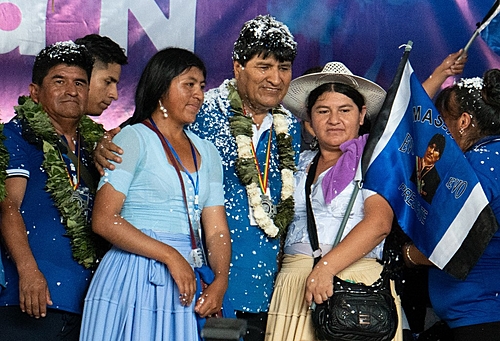
The divergence in the political group that governs Bolivia has become official. President Luís Arce and vice David Choquehuanca are no longer part of the MAS (Movement to Socialism) party, which ratified the decision, informally announced on the 24th, to present former president Evo Morales (2006-2019) as its candidate in the 2025 elections.
MAS held its tenth congress in the last two days, in the city of Lauca Ñ, in a coca-growing region in the center of the country. At the time, the party decreed the “self-expulsion” of Arce and Choquehuanca, for not having attended the meeting, and 20 other deputies aligned with the Arce government.
On Tuesday (3), the day of the inauguration of the congress, Arce appeared by surprise at a meeting of farmers in La Paz. He explained that he would not go to Lauca Ñ because the call had taken away space from several social organizations, such as the powerful Confederação Sindical Única of Rural Workers, while the representation of the party apparatus grew significantly. In other words, a rule that would have been tailor-made for Morales and served as justification for social leaders aligned with Arce to ignore the event and call their own congress for October 17th.
Arce’s group of followers questioned the legitimacy of the congress before the Constitutional Court, which ordered its suspension just hours before its end. Morales expressed concern on his social media about an alleged ongoing police intervention, which did not occur. “Unfortunately, the government of Lucho and David, worse than the neoliberal governments, wanted to postpone the congress until the last moment,” said the former president in his speech.
“We continue to make national and international history. MAS will recover the revolution to save the country again”, said Morales.
On X (formerly Twitter), Evo posted: “The unity, determination, conscience and dignity of the MAS members prevailed over the desperate acts that tried in vain to sabotage, even threaten our lives, and use some judges politically to make us fail. The strength of the people is unstoppable and invincible, sisters and brothers.”
The unity, determination, conscience and dignity of the MAS-IPSP militancy prevailed over the desperate acts that tried in vain to sabotage, even attack our lives and even use some judges politically to make us fail. The strength of the people… pic.twitter.com/0i0fK0kvyX
— Evo Morales Ayma (@evoespueblo) October 4, 2023
The Constitutional Court’s decision could render congress resolutions invalid from a legal point of view. MAS would not have fulfilled the requirement to renew its leadership required by electoral law, which would have put its legal existence at risk. A panel of Morales’ lawyers told the press that the Constitutional Court’s decision was “fraudulent” and would have no legal effect.
If the Constitutional Court’s decision prevails, the Electoral Court will have to grant a deadline for MAS to organize a new congress and choose another leadership. Or cancel the party, which could have unpredictable political consequences.
At the MAS congress, hundreds of leaders dressed in the party’s blue color, wearing t-shirts and caps with Morales’ image, proclaimed him as “undisputed leader”. At the same time, the farmers who met with Arce called him “academic”, “scholar” and “the greatest scientist in South America in the economic area”.
What is at stake is a dispute to decide who will be the candidate from the popular and indigenous sectors. According to the latest census in Bolivia, 40.6% of the population declares itself indigenous. Morales was the first president representative of this segment of the population. He came to power after a process of impoverishment of the population — between 1998 and 2002, the Gross Domestic Product (GDP) per capita fell by 20% and unemployment doubled — and led a process of income redistribution.
Morales left power after suffering a coup d’état in 2019. After the provisional government of Jeanine Áñez, who is now in prison, Luis Arce, who had been Minister of Economy in the Morales government, was elected president in 2020.
Editing: Leandro Melito

Source: www.brasildefato.com.br

